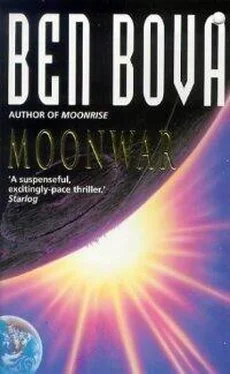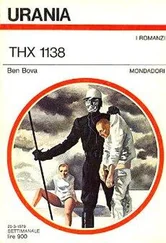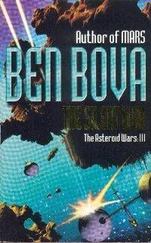Ben Bova - Moonwar
Здесь есть возможность читать онлайн «Ben Bova - Moonwar» весь текст электронной книги совершенно бесплатно (целиком полную версию без сокращений). В некоторых случаях можно слушать аудио, скачать через торрент в формате fb2 и присутствует краткое содержание. Год выпуска: 1997, ISBN: 1997, Издательство: Hodder & Stoughton, Жанр: Фантастика и фэнтези, на английском языке. Описание произведения, (предисловие) а так же отзывы посетителей доступны на портале библиотеки ЛибКат.
- Название:Moonwar
- Автор:
- Издательство:Hodder & Stoughton
- Жанр:
- Год:1997
- ISBN:0-340-68250-7
- Рейтинг книги:4 / 5. Голосов: 1
-
Избранное:Добавить в избранное
- Отзывы:
-
Ваша оценка:
- 80
- 1
- 2
- 3
- 4
- 5
Moonwar: краткое содержание, описание и аннотация
Предлагаем к чтению аннотацию, описание, краткое содержание или предисловие (зависит от того, что написал сам автор книги «Moonwar»). Если вы не нашли необходимую информацию о книге — напишите в комментариях, мы постараемся отыскать её.
Douglas Stavenger and his dedicated team of scientists are determined to defend their life’s work, but technology-hating factions on Earth want to close the flourishing space colony, Moonbase. Can a combination of military defence and political wisdom save the colony?
Moonwar — читать онлайн бесплатно полную книгу (весь текст) целиком
Ниже представлен текст книги, разбитый по страницам. Система сохранения места последней прочитанной страницы, позволяет с удобством читать онлайн бесплатно книгу «Moonwar», без необходимости каждый раз заново искать на чём Вы остановились. Поставьте закладку, и сможете в любой момент перейти на страницу, на которой закончили чтение.
Интервал:
Закладка:
He sat up straight and raised his arms over his head, stretching until he felt his vertebrae pop. Well, he said to himself, at least the dancers don’t eat much. I guess.
Of all the two thousand, four hundred and seventy-seven men and women at Moonbase, only one had the slightest military experience. One of the construction technicians working on the new aquaculture tanks, a man named Leroy Gordette. His file showed that he had spent four years in the U.S. Army, enlisting when he had been seventeen, nearly ten years earlier.
His photo on the wall screen showed a serious, almost grim Afro-American with red-rimmed eyes and a military buzz cut almost down to his scalp. He looks fierce enough, Doug thought, staring at the picture.
“It’s better than nothing,” Doug muttered. “Phone,” he called.
“Call please?” asked the computer’s androgynous synthesized voice.
“Leroy Gordette,” he said to the phone system.
“No response,” said the computer a moment later. “Do you wish to search for him or leave a message?”
“Leave a message.”
“Recording.”
“Mr Gordette, this is Douglas Stavenger. Please call me as soon as you can. It’s about the military situation we’re in.”
With twenty-twenty hindsight, Doug could see that this confrontation had been inevitable from the day Faure had won his campaign to be elected secretary-general of the United Nations; he intended to enforce the nanotech treaty with every weapon at his disposal. None of the others—not even Doug’s mother—had foreseen that it would come down to military force. But Doug had studied enough history to understand that force was the ultimate tool of political leaders. He had no illusions about it, despite his assurances that this ‘war’ was not going to be a shooting match.
Faure was no military genius, but he was a tyrant. He fully intended to make the U.N. into a true global government. With himself at its head.
Moonbase stood in his way. The nanotech treaty was just an excuse. As long as Moonbase ignored the U.N.’s authority, nations on Earth could justifiably resist U.N. encroachments on their sovereignty. So Moonbase had to be brought into line. Or destroyed.
The trouble was, the more Doug studied history, the more he delved into the bloody, murderous track that led to the present day, the more he found himself reluctantly agreeing with Faure’s professed aims.
Ten billion people on Earth. And that was only the official count. There were probably a billion more, at least, that the various national censuses missed. Ten or eleven billion mouths to feed, ten or eleven billion people to house and clothe and educate. Most of them were poor, hungry, ignorant. And their numbers were growing faster than anyone could cope with. Three hundred thousand babies born every day. All the wealth in the world could barely maintain a minimum level of existence for them.
The rich refused to help the poor, of course. Not unless the poor reduced their birth rate, lowered their numbers. Starvation swept whole continents; plagues killed millions. Still the numbers grew. The poor of the world increased and multiplied and became poorer, hungrier, sicker.
Only a world government could hope to deal with the global problem of population. Only a true world government had the faintest chance of redistributing the world’s wealth more equitably. That was Faure’s proclaimed goal, his aim.
Doug agreed that the goal was worthy, vital, crucial to the survival of the human species. He also knew that it would never be achieved; not the way Faure was going about it.
The beep of his computer snapped Doug out of his ruminations. Its message light blinked at him.
“Answer,” he commanded the phone.
It was not Gordette returning his call. Doug recognized the face of one of the communications technicians, calling from the control center.
“Doug, we’re getting a transmission from L-1. Single frequency. The secretary-general of the United Nations is about to give a speech and they want us to see it.”
“Okay,” he said, sagging back tiredly in his chair. “Pipe it through. Might as well put it on the general system, so everybody can see it.”
“Will do.”
Then Doug got as better idea. “Wait. Make an announcement that anyone not on essential duty should go straight to The Cave. Put Faure on the wall screens there. I want everybody to see this.”
“Will you be going to The Cave, too?”
“Right,” said Doug, pushing himself out of his chair.
TOUCHDOWN MINUS 112 HOURS
Georges Henri Faure felt not the slightest twinge of nervousness as he walked slowly to the podium. The General Assembly chamber was hushed, so quiet that Faure could hear his own footsteps on the marble floor, despite the fact that the chamber was completely filled. Every delegate was in his or her proper seat. The media thronged the rear and overflowed into the side aisles, cameras focused on him. The visitors’ gallery was packed.
He was a dapper little man, shaped rather like a pear but dressed so elegantly that no one noticed his figure. Nor the slight limp that marred his stride. His thinning dark hair was slicked back from his high forehead, and his face was round, pink-cheeked, almost cherubic except for his old-fashioned wire-brush moustache. On the rare occasions when his iron self-control failed and he became agitated, the points of the moustache would quiver noticeably. It sometimes made people laugh, but it was a bad mistake to laugh at Georges Faure. He neither forgot nor forgave.
His eyes were small, deep-set, dark and never still. They constantly darted here and there, watching, weighing, probing, judging. Many said, behind his back, that they were the eyes of an opportunist, a climber, a politician. Faure knew what they said of him: that he was a man consumed by ego and vaulting ambition. But no, he insisted to himself; what drove him was not personal ambition but an inner desire, a drive, a sacred mission: to save the world from itself; to bring order and stability to all of humankind; to avert the tragedy of chaos and disaster that threatened the Earth’s misguided peoples.
He reached the marble podium. The floor behind it had been raised slightly, cunningly, so that no one in the audience could see that he actually stood on a platform. Smiling down on the rows of expectant faces, he leaned his weight on his arms, to ease his aching foot. He waited a moment, feeling the warmth of the undivided attention of every delegate, the glow of the media’s cameras and recorders, the admiration of the public. The first line of his speech was on the electronic prompter; the tumbler on the podium held the Evian water he was partial to. Everything was in its place.
He began:
“Delegates of the General Assembly and the Security Council, members of the news media, members of the public and citizens of the world—I stand before you with a heart filled with both sadness and hope.
“Since seven years ago, all work on nanotechnology has been wisely banned by mutual accord of the member nations of this august organization. I am pleased to report to you that the last remaining nation on Earth to refuse to sign the nanotechnology treaty and accede to its terms has now at last signed that treaty. Kiribati has joined the great commonwealth of nations at last!”
A storm of applause rose from the floor of the huge auditorium. A sharp-witted observer would have noted that it began in the section where the U.N. staff bureaucrats sat: Faure’s employees.
In Moonbase, Doug sat at one of the tables in The Cave, the old cafeteria, watching the wall-sized display screen showing Faure. The Cave was jammed with people; everyone who was not needed on duty had packed its cavernous confines. All the seats along the cafeteria tables were filled and people were standing shoulder-to-shoulder in the aisles between the tables; the only open spaces were the squares of lovingly tended grass that were scattered across the rock floor. It was like a flare party, Dough thought, although no one was drinking or dancing. Or laughing.
Читать дальшеИнтервал:
Закладка:
Похожие книги на «Moonwar»
Представляем Вашему вниманию похожие книги на «Moonwar» списком для выбора. Мы отобрали схожую по названию и смыслу литературу в надежде предоставить читателям больше вариантов отыскать новые, интересные, ещё непрочитанные произведения.
Обсуждение, отзывы о книге «Moonwar» и просто собственные мнения читателей. Оставьте ваши комментарии, напишите, что Вы думаете о произведении, его смысле или главных героях. Укажите что конкретно понравилось, а что нет, и почему Вы так считаете.












